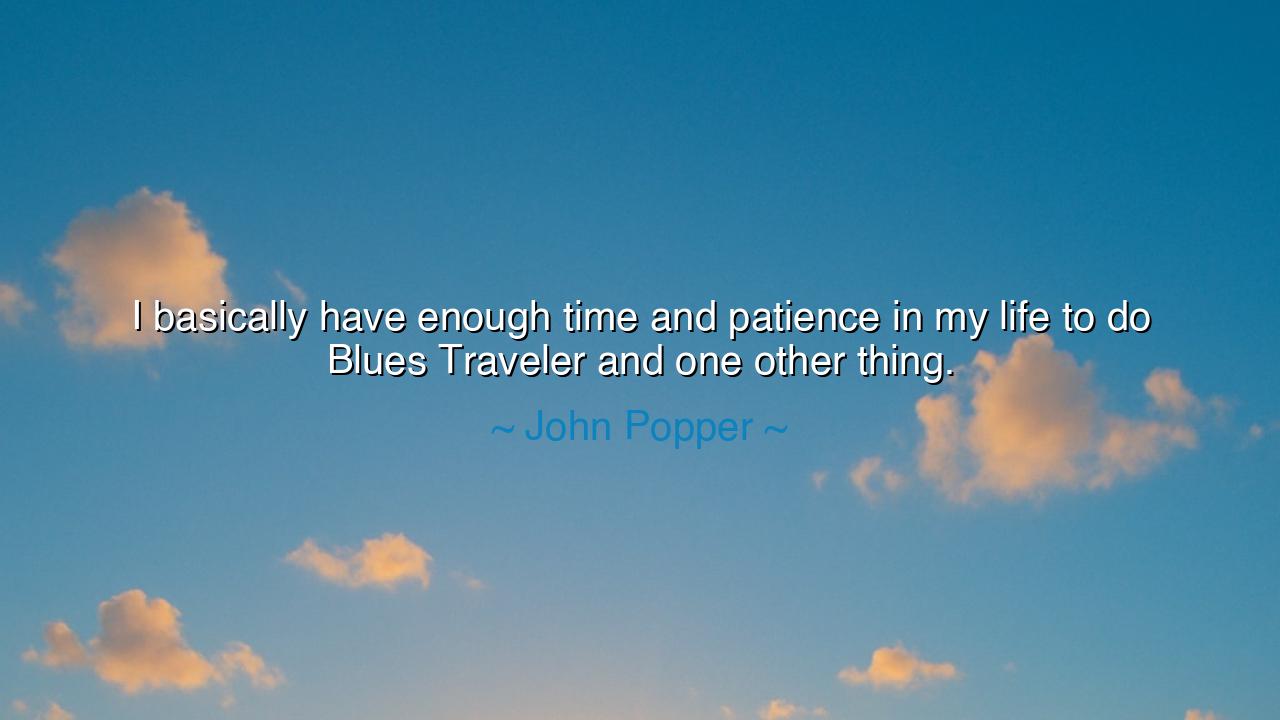
I basically have enough time and patience in my life to do Blues
I basically have enough time and patience in my life to do Blues Traveler and one other thing.






Hear now the voice of John Popper, who spoke with candor and simplicity: “I basically have enough time and patience in my life to do Blues Traveler and one other thing.” Though it seems but the humble reflection of a musician upon his craft, it carries within it the weight of eternal wisdom. For in these words lies the acknowledgment of the boundaries of human strength, the recognition that the days of a man are finite, and that to spend them well requires both discipline and devotion.
In speaking of time, Popper invokes that most precious of treasures, the one wealth that no king can hoard nor beggar extend. Time flows as a river, unpausing, unyielding, heedless of our cries. To know that one can give it to but “one other thing” is to confess both its brevity and its power. The ancients too wrestled with this truth; Marcus Aurelius wrote in his meditations that life is but a single breath, and that we must act with purpose lest it vanish unused. Popper’s saying echoes this wisdom, urging us to measure carefully what we shall pour our hours into.
He speaks also of patience, that virtue which binds passion to endurance. For it is not enough to merely desire a thing; one must also suffer its difficulties, endure its trials, and tend to it faithfully. Blues Traveler, to him, is not just a band but a lifelong devotion, requiring years of practice, sacrifice, and persistence. So too in our own lives, any endeavor worthy of our energy will demand more than enthusiasm—it will demand patience, the slow-burning fire that sustains through failure and fatigue.
Consider the story of Michelangelo, who labored four long years upon the ceiling of the Sistine Chapel. He might have taken on many works, scattering his genius thin as dust upon the wind. Yet he focused his time and poured out his patience upon one task of eternal significance. The result was not merely paint upon plaster, but a vision that would inspire mankind for centuries. In the same spirit, Popper’s words remind us that greatness comes not from scattering ourselves across many paths, but from dedicating ourselves fully to the few that matter most.
The origin of this quote, though spoken in the context of music, is universal in its reach. It is the voice of a man who knows himself, who understands that to do well in one field, one cannot be consumed by too many others. It is the wisdom of limitation, of saying no to the many in order to say yes to the one. In this, Popper’s words are both confession and counsel, for they teach us that mastery arises from focus, not from endless wandering.
Thus, the lesson is plain: choose wisely the one or two things that shall define your journey, and pour into them your heart, your time, and your patience. Do not be deceived by the false promise that you may master all roads, for the river of life is short, and to run too many currents is to drown in shallows. Instead, devote yourself wholly to that which calls most deeply to your soul, and let the rest fall away as chaff in the wind.
Therefore, O listener, take this counsel into your days: guard your time, for it is your only true wealth; cultivate patience, for it will carry you where passion cannot; and above all, choose your path with care. In doing so, you will not scatter your spirit, but concentrate it, as the sun through a lens ignites a flame. And that flame, tended with faith, will burn brightly enough to leave behind a mark upon the world.
So let Popper’s words be for you a compass: “Blues Traveler and one other thing.” Not many things, not countless diversions, but one calling and one companion. May you, too, find your one or two, and devote yourself to them, that your life may not be wasted in fragments, but gathered into a work of meaning. Time and patience, rightly spent, are the architects of all greatness.






AAdministratorAdministrator
Welcome, honored guests. Please leave a comment, we will respond soon